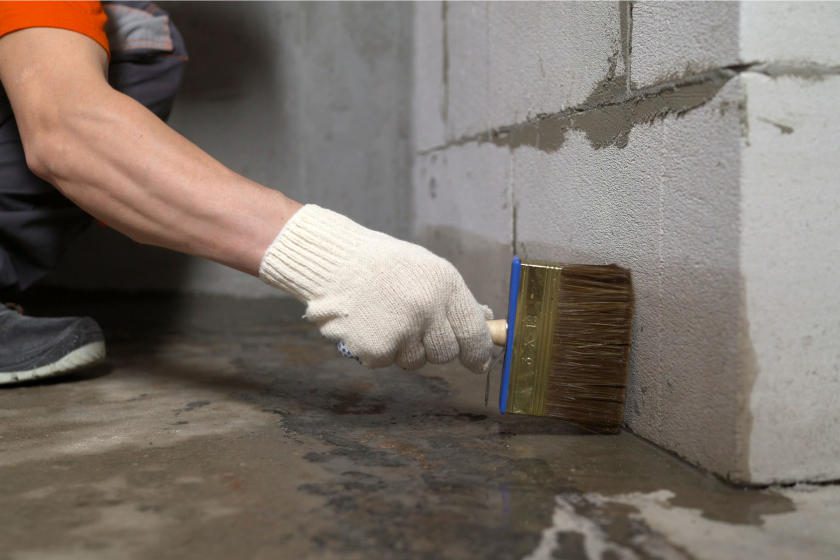Table of Contents
Learn The Basics Of Basement Wall Repair
Every homeowner is familiar with basement wall repair. The basement wall is critical in establishing a firm foundation for the structural stability of your home. Basement walls deteriorate with time, and for a variety of causes, cracks or water damage emerge on the walls, which must be repaired promptly before the damage worsens. Minor cracks or leaks problems can be easily solved by the homeowners but for major damage, you will need to hire one of the best basement repair companies to get expert services. Many homeowners are still unaware of the underlying problems, solutions, and preventive measures. In this blog, we will explore the basics of basement wall repair.
Understandings Basement Wall Problems
Understanding the basement wall problems will help the homeowners to detect the problem and can easily take immediate action to prevent further damage.
Cracks:
One of the most frequent problems with basement walls is cracking. Numerous things, including foundation settling, soil movement, hydrostatic pressure, and temperature changes, can cause them. As they could signify excessive strain against the wall, horizontal fractures are frequently cause for concern. Although vertical cracks are often less serious, they still need to be fixed. The underlying reason and the appropriate repair strategy may be determined by determining the size, direction, and placement of the cracks.
Bowing Walls:
The dirt around a basement’s walls may exert too much strain, causing the walls to bend or bulge inward or outward. Hydrostatic pressure, which happens when water accumulates around the foundation and presses forcefully against the walls, is a common cause of this issue. Bowing walls should be immediately fixed since they might jeopardize the building’s structural stability. Ignoring the problem may result in more wall displacement, a higher danger of collapse, and expensive repairs.
Water Damage:
Walls in basements are particularly vulnerable to water incursion. Water can leak into cracks or openings in the walls, causing moisture issues and perhaps structural damage. Long-term moisture exposure can weaken the foundation, damage the structural integrity of building components, and promote the spread of mold and mildew. Moisture, musty smells, water stains, flaking paint, or apparent mold growth are indications of water damage. To avoid problems caused by standing water, proper drainage, and waterproofing solutions are necessary.
Evaluating Structural Integrity:
Evaluation of the structural integrity of the basement walls is crucial before beginning any repair work. In order to do this, it is necessary to evaluate the severity of the fractures, look for indications of bowing or tilting, and determine whether the foundation is sound. It is strongly advised that you see a qualified engineer if there are any serious structural problems.
Identifying the Signs of Basement Wall Damage
To stop future degradation, it’s critical to be watchful and spot the early indications of basement wall damage. Common signs include:
a) Vertical and horizontal fissures that may be seen running down the basement walls.
b) Walls that are bulging or bending because of too much pressure.
c) Stains from water, moisture, or mold development on the walls or floor.
d) Doors or windows that are challenging to open or close as a result of shifting foundations.
Causes of Basement Wall Damage
Hydrostatic Pressure:
Hydrostatic pressure is one of the main reasons why basement walls are damaged. Pressure is put on the basement walls when the soil around the foundation gets water-logged. If not immediately relieved, this pressure may cause fractures, bending, or even collapse. Increased hydrostatic pressure can be caused by inadequate drainage systems, poor grading, or significant rainfall.
Poor Construction:
Weakened basement walls might be the consequence of poor construction methods or the use of inferior materials during the original building stage. The foundation design or insufficient reinforcement may have resulted in the walls bowing, shifting, or cracking over time. External variables like soil conditions or water intrusion might make these structural flaws worse.
Expansive Soils:
Some soil types, like clay, have a propensity to expand and contract as a result of variations in moisture. Expansive soils can press on basement walls as they get wet. This pressure can cause fissures and structural instability over time. For determining the likelihood of basement wall damage, it is essential to understand the soil composition surrounding your property.
Poor Drainage:
Basement walls must have good drainage in order to stay healthy. Water can build up around the foundation as a result of improper drainage system design or failure. As a result of the added pressure from the extra water, the walls may fracture or bend. Inadequate drainage may be caused by poorly placed downspouts, blocked gutters, or poor grading.
Tree roots:
Although trees are attractive and offer shade, their roots can damage foundation walls. When tree roots go too close to a foundation, they may put a strain on the walls since they are naturally drawn to water supplies. This strain may potentially endanger the walls’ structural integrity by causing fractures in them. When landscaping the area surrounding your home, it is crucial to take root growth and tree placement into account.
Basement Wall Repair Techniques
Crack Injection:
The existence of cracks in basement walls is one of the most prevalent problems. These fissures may develop as a result of soil movement, water pressure, or foundation settling. To fix these fissures, a common approach is crack injection. To repair the cracks and stop water infiltration, epoxy or polyurethane resin is injected into them. This method not only fills up the fractures but also strengthens the wall’s structure to stop additional deterioration.
Carbon Fiber Reinforcement:
Basement walls that are bowing or tilting are a severe issue since they signify structural instability. An efficient method for stabilizing and bolstering bending walls is carbon fiber reinforcement. It entails covering the wall’s surface with sheets or straps made of carbon fiber. These carbon fiber materials offer the wall more support and stop it from moving further since they are lightweight but highly strong. This procedure is minimally invasive, and economical, and produces effects that last.
Wall Anchor:
In order to correct significant bending or leaning of basement walls, wall anchors are frequently utilized. This method entails drilling tiny holes in the damaged wall and setting steel wall anchors deeply into the surrounding earth. A steel rod is then used to attach these anchors to the wall, and they are subsequently tightened to progressively straighten and stabilize the wall. Wall anchors work well in balancing the pressure from the outside and halting additional wall movement or bending.
Water Damage:
In basements, water damage is a typical issue that frequently results in the degradation of walls and jeopardizes the foundation. It’s crucial to waterproof the basement walls to stop water ingress and subsequent damage. This method entails treating the interior or external surface of the walls with waterproof coatings or sealants. In addition to safeguarding the walls and preserving a dry atmosphere, it forms a barrier that stops water from leaking into the basement.
Drainage System Installation:
To avoid water buildup near the foundation, which may result in basement wall damage, proper drainage is crucial. Hydrostatic pressure on the walls can be reduced by installing a drainage system, such as a French drain, which can assist move water away from the foundation. This method is particularly helpful for dealing with problems involving water, such as fractures brought on by hydrostatic pressure.
Conclusion
Repairing your basement walls is essential for keeping your house physically sound and making the most of your basement area. You can protect your property from additional harm and make the most of your basement by grasping the fundamentals of issue identification, cause analysis, and application of effective repair solutions. This thorough book provides you with the information to take preventive measures and make wise decisions for successful basement wall repair, whether you’re dealing with cracks, leaks, or bending walls. Always remember to seek expert help when in doubt to guarantee the security and stability of your house. It’s critical to choose the proper people for the task, whether you’re looking for a roofing expert near me, Indiana roofing contractors, roof repair Indiana, skilled home foundation repair near me, or Michigan commercial roofing services. Remember to emphasize your home’s long-term stability and integrity, and consult with an expert roofing company. Contact us soon to secure the safety of your basement walls!
- Both vertical and horizontal cracks can be seen in basement walls and are frequently noticeable. Especially around corners, windows, and doors, scan the walls for any apparent cracks, lines, or fractures.
- Water leaks may be avoided with proper waterproofing. By maintaining adequate grading and downspout extensions, you may ensure good outside drainage. If necessary, add indoor drainage solutions like sump pumps, external waterproofing membranes, or waterproof coatings.
- When dealing with serious structural problems like substantial fractures, widespread bowing, or significant water intrusion, it is advised to seek expert assistance. A good assessment and suitable repair techniques are ensured by consulting a contractor or structural engineer.

